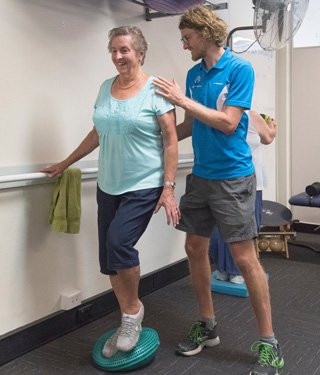Strength Training – Part 1 of 2
Strength – be the strongest that you can be and feel the far-reaching improvements in your quality of life.
In this two-part blog-post, Dan Cornish discusses how strength training will improve not only your physical capacity, but also how it will improve your mental game. Dan is an Accredited Exercise Physiologist with ESSA and is part of the Health in Balance team located at Elsternwick, Victoria.
Part 1.
I want to get stronger!
If you were to embark on an exercise program today, what would be your main reason to start? If you’re like many of our clients, it starts with a desire to be ‘Fitter’, and Stronger. Exercise Physiologists can be pesky, nosey people. We ask a lot of questions; questions such as “why do you want to be stronger”, and “if you were stronger, how would your life be different?”
Strength – what does it mean to you? It’s a loaded word isn’t it? A quick search of Google, defines ‘Strong’ as “having the power to move heavy weights or perform other physically demanding tasks”, and “able to withstand force, pressure, or wear”. The concept of strength clearly has a multitude of meanings to different people, and it’s often one which brings to mind connotations of both physical and mental capacity. As you may have discovered in your own life, physical and mental strength are very closely related – when one increases, often the other does too.
How do we increase Physical Strength?
There is no debating that strength training (aka Resistance Training, RT for short) will make you physically stronger. We all have a friend or family member who goes to the gym or lifts their own dumbbells at home, and is either a) an Arnold Schwarzenegger protégé; and/or b) the person you call when you’ve a cubic meter of soil needed to be shoveled around the garden. Research studies consistently show that people of any age become physically stronger after a period of RT exercises.
When we lift weights or do any physical training which we’re not accustomed to, our muscle cells are stressed, stretched and broken down, with the level of damage dependent on the time the muscles spent under tension and the amount of load we used. But never fear, because our body is an amazing healing machine, it rushes to the rescue, delivering proteins to the damaged areas which help to not only repair the tissue, but also make it more resilient, robust, and better able to generate force in the future (isn’t our body wonderful?!). Furthermore, physical changes occur in our brain when we strength train. Our motor cortex physically re-organises itself, and new nerve networks are developed and replaced which leads to faster signals between our brain and the muscular system (think NBN fibre optic replacing Telstra’s archaic coaxial wiring). Collectively, your brain and nervous system gets better at recruiting muscles, which makes your movements stronger. As Exercise Physiologists, we specialize in assessing your movement capacity (and the force generation of the muscles which cause this movement to occur). Our exercise programs then focus on making the muscles stronger, thereby improving your body’s capacity to deal with your current daily movements more efficiently, more easily, and often enabling you to do things you may have once thought impossible.
Increase the can do’s.
As a man now in my 30s, you may be surprised to hear that I too feel physical challenge in things that 10 years ago could be done eyes closed. My own personal dedication to physical strengthening only really begun three years ago. I was at a workshop with a group of Osteopaths and Exercise Physiologists, and noticed a grave disparity between my movements and those of the other practitioners around me. Although, my cardiovascular fitness was at a high standard, my physical strength deficits limited my ability to complete 90% of the movements that were being taught. As the exercises had huge potential to benefit my own clients, it appeared that my own strength deficiencies were limiting the potential gains of some of my clients, younger and older alike. I begun a structured RT program at home, and three years on, still each week, I notice things getting easier. Whether it be a difficult rock climbing move, being able to stand cross-legged from the floor with no hands (once an impossibility), or not feeling tired in my lower back after a long day of hiking on rugged terrain. You also have the capacity to increase the ‘can dos’ in your life.
Our clients, people like yourself, excitedly tell us on a daily basis their breakthroughs – a new ‘can do’. For some, it may be things around the house: being able to reach up to the highest shelf in the kitchen, or squat down to check the dinner cooking in the oven; vacuuming the entire house without feeling exhausted, or simply getting up from your favourite chair which doesn’t have arm-rests. For others it may be being able to step up (or down) those damned steps on Melbourne trams; or walking from Melbourne’s Elwood to Brighton along the sandy beach. For others, it may be doing a squat without knee pain, getting to the floor to play with the grandkids, or join in the Mexican wave at the cricket (without tweaking that once niggly left shoulder!). What are some of the things that you feel you ‘can’t do’, that you want to convert to a ‘can do’?
You have the potential to change
It really is exciting isn’t it? The prospect of being able to confidently say “I can do”. The prospect of being the strongest person that you can be.
For more details about our tailored strength training programs, under the guidance of an Accredited Exercise Physiologist, don’t hesitate to call Health in Balance on 03 9523 5110.


